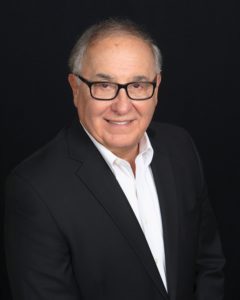
Roman Maes, III,
Roman Maes, III, Distinguished Alumnus
Roman Maes, III, a longtime New Mexico business leader, is the founder and CEO of Access Communications, a prominent government and public relations firm in the southwestern U.S.
Maes was also a leader in the New Mexico Legislature for 20 years, serving with distinction as the state senator representing District 25, which encompasses Santa Fe County.
Maes earned his bachelor’s in business administration from Highlands in 1968, and his doctor of jurisprudence from the University of Denver School of Law in 1971.
“At Access Communications, I provide opportunities for my clients to communicate with decision makers in both the public and private sector to advance their services and products,” Maes said.
He established Access Communications in 2011, a spinoff of New Mexico Public Relations, LLC, which Maes founded in 2005. He expanded his business into Arizona, Nevada and California.
Some past and present clients include Cisco Systems, Qwest, Microsoft, Behavior Change Institute, LLC, Fidelity Insurance and Blackboard, Inc.
“Roman’s knowledge of New Mexico, including its business and political dynamics, helped him become one of the state’s leading governmental relations firms,” said Bill García, the Highlands Foundation Board president who nominated Maes.
Maes is also a real estate expert and licensed broker in three states. From 1985 – 2014, he was the founder and managing partner of Four Star Property Management in New Mexico and Five Star Properties in Arizona.
During his state senate tenure from 1985 – 2005, Maes held numerous leadership positions which included chairing five legislative committees.
“As a state senator, I wanted to be part of positive change, and see New Mexico compete globally in all areas of business,” Maes said.
Maes sponsored 165 bills that became state law on topics like education, the environment, economic development, state budget and appropriations.
“I am most proud of the 1998 Solid Waste Act that helped prevent our state from becoming the solid waste capital of the U.S. Before that, our solid waste laws were very weak,” Maes said.
Before running for public office, Maes was appointed to the New Mexico State Board of Finance. He was also a civic leader in Santa Fe, chairing entities like the Santa Fe Planning Commission and Santa Fe Affordable Housing Authority. After his state senate tenure, Roman was appointed to serve as a transportation commissioner for the New Mexico Department of Transportation.
Maes said he got a well-rounded education at Highlands that provided him with the tools he needed to move forward successfully in life.
“Highlands offered me a great deal of opportunities and outstanding professors in the School of Business,” Maes said.
He is a Las Vegas, New Mexico, native whose family goes back five generations in New Mexico.
“Las Vegas was a wonderful place to grow up. Then at Highlands, there was a real sense of community. The university was like family to me,” Maes said.
He was one of the founding members of the Highlands Alumni Association in 1984.
Maes has been married for 48 years to his high school sweetheart Dolores. The couple raised two children, Roman IV and Tanya. Maes said semiretirement gives him the chance to spend more time with his four grandchildren.
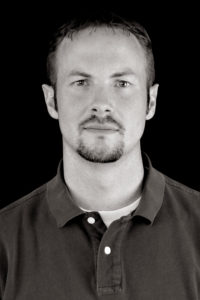
Joe Winkles
Joe Winkles, Distinguished Young Alumnus
Joe Winkles is the president and CEO of MindShare, Inc., a technology training company that is a global leader in the industry.
Winkles graduated summa cum laude in 2001 with his B.S. in engineering.
Since Winkles, 38, started working as a technology trainer at MindShare in 2003, he has trained thousands of engineers in the U.S. and worldwide for companies such as Intel, Apple and Samsung. He rose to president and CEO in 2011.
“In the 15 years since he graduated from Highlands, Joe has been astoundingly successful,” said Doyle Daves, the Highlands Foundation member who nominated Winkles.
Winkles continues to conduct technical training while leading a team of engineers that delivers training on every continent except Antarctica.
“We teach engineers how computer chips work, and how to design new technologies for devices like phones, tablets, laptops and servers,” Winkles said. “It’s very exciting to be on the leading edge of new technologies for these devices.”
Winkles said he enjoys teaching and sharing knowledge.
“It gives me great pleasure when I’m teaching a complex concept to engineers and see the ‘aha’ moment when they understand,” Winkles said.
He said MindShare has been blessed and was looking for ways to give back, forming a partnership in 2015 with the nonprofit Field of Dreams Uganda to provide free computers and technical training for teachers of orphans and other vulnerable Ugandan children.
“There is so much knowledge at our fingertips that we take for granted that other people don’t have. Most of these Ugandan classrooms have no computers and inadequate textbooks. Access to information on the Internet alone is extremely powerful for a student’s education,” Winkles said.
After graduating from Highlands, Winkles’ first engineering position was with AMD, a high-tech company in Austin, Texas. He worked as a verification engineer testing the functionality of new processors and later joined the processor design team.
While at AMD, Winkles took a technical training course the MindShare founder taught. Within weeks, he was working evenings as a technical editor for MindShare. He was hired full-time as a technical trainer in 2003.
The Texico, New Mexico, native came to Highlands on a full academic scholarship. He said engineering professor Djuro Zrilic inspired and mentored him.
“Dr. Zrilic took a few of us engineering freshman under his wing and taught us about concepts you don’t usually learn as a freshman, like digital design. He obtained research grants from NASA and involved us in research,” Winkles said.
Under Zrilic’s guidance, Winkles and other engineering students published their NASA research and presented at national conferences.
“The goal of a university education is to teach a person how to learn and problem solve. Highlands is very good at both,” Winkles said.
He said he was well prepared for his first engineering job, working alongside graduates from nationally known schools like Stanford and Purdue.
Winkles married his high school sweetheart Robin 19 years ago when they were both students at Highlands. Robin earned her B.A. in health education. They have two daughters, Kylie and Alyssa.
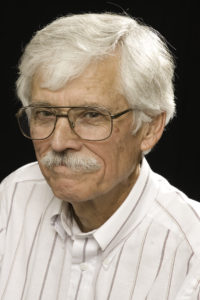
Bob Mishler
Bob Mishler, Distinguished Retired Faculty
Bob Mishler joined Highlands in 1969 as the university’s first full-time anthropology faculty member, the beginning of a 38-year career with the university. He established the university’s first anthropology laboratory in 1970 and directed it until his retirement in 2007.
The Indiana native said his interest in anthropology was sparked when he was a young college graduate teaching at an adult trade school in Nigeria from 1960-1961. After returning to the U.S. he taught social studies before returning to graduate school at the University of Colorado – Boulder to earn his master’s degree in anthropology.
“Anthropology provides a framework for how to understand human existence and fits my view of the world,” Mishler said. “The world has a tremendous amount of antiquity, and everything in it is part of an infinite process of change over time.”
During his tenure at Highlands, Mishler conducted 35 annual field archeological investigations with his students, collecting many of the artifacts that are still part of the university’s anthropology laboratory.
“What’s unique about the archaeology in Northern New Mexico is its interplay between the pueblo worlds to the west and the High Plains dwellers to the east,” Mishler said.
The archeological field schools were centered primarily at the Tecolote Pueblo and the Tinsley Site, a small pueblo. Both are within 20 minutes of Highlands.
“Working with students in the field is a total immersion experience. You are training students in an academic arena, but they’re also working as a team in the sun and dust. Field school provides a foundation for building a picture of ancient pasts, but it’s only a beginning,” Mishler said.
A major focus of Mishler’s research was cultural resource surveys used to identify and protect cultural history. He secured approximately $1 million in archaeological grants for Highlands during his tenure.
Highlands anthropology professor Warren Lail was one of the people who nominated Mishler for the distinguished retired faculty honor.
“Bob Mishler was a beloved professor at Highlands and a kind mentor to me when I first arrived at Highlands eights years ago,” said Lail, who is also interim dean of graduate studies. “Bob is revered by students who studied under him. He continues to contribute to the Highlands and Las Vegas communities. Bob is a true treasure.”
Mishler has always been deeply rooted in historic preservation and planning in Las Vegas, culminating with receiving a Lifetime Achievement Award from the New Mexico Historic Preservation Division in 2010.
“Very rapid changes are destabilizing to humanity, but historical preservation provides a grounding, a reference, for the past,” Mishler said.
His service on the City of Las Vegas Design Review Board began in 1974 and he is the current chair. Mishler was a co-founder of both the Friends of the City of Las Vegas Rough Rider Museum in 1997, which he chairs, and the Las Vegas Citizens Committee for Historic Preservation.
“This fall the museum is publishing a photo history book of Las Vegas from 1845-1935 featuring photos that mostly haven’t been published before,” Mishler said.
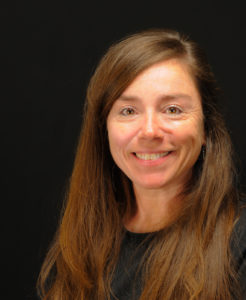
Jennifer Lindline
Jennifer Lindline, Spirit Award
Jennifer Lindline, a Highlands geology professor and Natural Resources Management department chair, was named for the Spirit Award for her dedication to students and research.
Fellow geology professor Michael Petronis nominated Lindline for the honor.
“Dr. Lindline is truly an outstanding professor who serves as a model for junior faculty, as well as undergraduate and graduate students, with her spirit, dedication and numerous research endeavors,” said Petronis, who has worked with Lindline for 10 years. “Her energy and enthusiasm permeates the classroom, and her dedication to the students of Highlands is unmatched.”
In 2016, Highlands President Sam Minner selected Lindline as the first HU President’s Leadership Fellow.
Lindline joined the university’s faculty in 2000. She earned her doctorate in geology with an emphasis in petrology and mineralogy from Bryn Mawr College in Pennsylvania.
“It’s the spectacular geology of the region that brought me to Highlands, but it’s the people that kept me here,” Lindline said. “There’s a can-do spirit, a commitment to individual students and the belief in each student’s ability to succeed.”
Lindline’s philosophy is that each student’s potential is limitless.
“Being part of my students’ academic growth – and watching them evolve from introductory learners to senior scholars – is very rewarding professionally and personally. From the beginning of my tenure at Highlands, the students showed an eagerness and hunger to learn. That’s powerful,” Lindline said.
In 2013, Lindline was named Professor of the Year after the Highlands University Geological Society, a student group, nominated her for the award, writing: “Dr. Lindline is an exceptional professor and overall extraordinary person who has her students’ interest at heart every day.”
Lindline said with Highlands’ location at the juxtaposition of the Sangre de Cristo Mountains and the Great Plains, the university has an exceptional and diverse natural geologic laboratory in its backyard.
“The accessibility of these nearby rock formations is a geologist’s dream. It’s simple: the best geologists see the most rocks. Immersing students in fieldwork is important because it’s when they get their hands on rocks and begin to establish the rock relationships that lead to hypotheses that are then tested in the lab. Research opportunities solidify classroom learning and promote scientific thinking at advanced levels,” Lindline said.
One primary focus of Lindline’s research is the evolution of volcanoes. Her research on the Rio Grande Rift volcanism in Northern New Mexico shed new light on one of the world’s great continental rifts.
“The Rio Grande Rift is a fantastic manifestation of volcanoes, faults and basins that dates back 35 millions years. My research focused on the geochemical makeup of basalt rocks on the surface,” Lindline said.
She has published numerous research studies and developed an international reputation as a petrologist.
Lindline and Petronis have been highly successful in securing scientific grant funding that involves students in cutting-edge geology field and laboratory research from New Mexico to France, Ireland, Czech Republic and Poland.
“International research partnerships help build global competence for our students, and prepares them to be the next generation of scientists,” Lindline said.
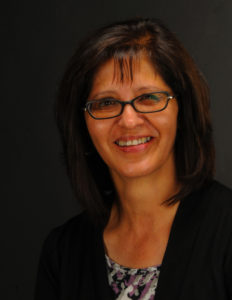
Susie Maestas
Susie Maestas, Distinguished Retired Staff
Susie Maestas retired from Highlands in June 2016 after 25 years of service, and was named for the new Distinguished Retired Staff honor.
Over the years, Maestas has held a variety of administrative assistant and secretarial positions in the Office of the Academic Affairs, Office of the President, School of Science and Engineering and Faculty Senate Office, and others.
Most recently, Maestas worked in the School of Education since 2010 as an administrative assistant. She tracked graduate students through a streamlined process she developed to help them successfully complete their degree.
Katherine King, School of Education department secretary, nominated Maestas for the honor.
“Susie Maestas served the university with distinction and in her particular kind and loving way,” King said. “Throughout her years of service, she treated each and every student and her many colleagues with the utmost compassion and professionalism.”
King said Maestas was an extraordinary guide and mentor to those who worked alongside her at Highlands.
“Susie’s commitment to the university is deep and extensive. We have all benefited from her wisdom, and thank her for all she has given to members of the Highlands family,” King said.
Maestas said she worked to make it as easy as possible for School of Education graduate students to navigate the paperwork and necessary milestones for their graduate studies, from the initial application through taking comprehensive exams.
“It’s very rewarding when I’ve tracked a student’s progress from the beginning of their graduate studies and I hear their degree is posted. I’m elated. It makes me so happy that their hard work has paid off,” Maestas said.
She said a memorable highlight earlier in her Highlands career was when she was the first person to incorporate the university’s budget into Banner – Highlands’ data tracking system.
Maestas said Highlands was always the right fit for her professionally and she had the opportunity to advance to positions of greater responsibility.
“I believe wholeheartedly in this university and didn’t have a desire to work anywhere else. We’re a close-knit family at Highlands that supports each other through good and bad. The camaraderie among staff at Highlands is infectious,” Maestas said.
She said mentors were plentiful during her tenure at Highlands.
“There were so many mentors along the way that inspired and encouraged me. I’ll always be grateful to the faculty, staff and administrators who shared their knowledge, and also taught me about how important it is to believe in what you are doing,” Maestas said.
She said her years at Highlands have been deeply rewarding.
Maestas is also a Highlands alumna. She earned her bachelor’s degree in business in 1991.
“I credit the business coursework and the professors’ high expectations with preparing me well for the work world. When I was a student, I knew I wanted to remain a part of Highlands as a staff member,” Maestas said.
As a retiree, Maestas said she is looking forward to having more time to camp, travel and spend time with her six grandchildren.
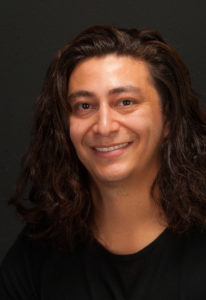
Leon Bustos
Leon Bustos, Forever Cowboy Student Award
Leon Bustos, who earned his M.A. in psychology from Highlands in summer 2016, was tapped for the new Forever Cowboy Student Award.
Bustos was a graduate teaching assistant and researcher for psychology professor Ian Williamson, who nominated him for the award.
“Leon has been a tremendous asset to the university by supporting hundreds of students on their journey at Highlands,” Williamson said. “His long list of roles includes peer mentor, orientation leader, supplemental instruction leader, teaching assistant, researcher and peer educator. He’s extraordinary,” Williamson said.
Bustos, who earned his B.A. in psychology from Highlands in 2013, was selected to deliver the keynote speech in 2014 at convocation, the ceremony welcoming incoming freshman.
Williamson said Bustos played a key role as a research assistant for a New Mexico Office of Substance Abuse Prevention grant to reduce substance abuse in San Miguel County.
“With this research grant, Leon adopted a leadership role and showed strong commitment to reducing substance abuse in our community,” Williamson said.
Bustos said his personal experience at Highlands motivated him to mentor other students.
“When I came to Highlands in 2009, I was an unprepared first-generation college student,” Bustos said. “I was lucky enough to work with Thomasinia Gallegos-Ortiz and David Esquibel in Academic Support. They really pushed, encouraged and believed in me. That kind of mentoring is powerful.”
Bustos said he fell in love with learning and chose psychology as his major.
“The psychology literature is clear that strong mentors provide enrichment that gives students the tools they need to be successful academically and professionally,” Bustos said.
He said in all his roles supporting other students at Highlands, he served as a first point of reference to let students know they are capable.
Bustos immersed himself in professional organizations like the Western Psychological Association, Rocky Mountain Psychological Association and Psi Chi International Honor Society, serving as HU’s Psi Chi student chapter president in 2014-2015.
One of Bustos’ primary research interests is environmental cognition and behavior. For his thesis, he studied the relationship between exposure to images of the natural environment and altruism.
“Generally, when people see beautiful images of nature with abundant resources like water and vegetation, the more likely they are to show altruistic behavior like generosity,” Bustos said.
As a psychology graduate student, Bustos led lectures and labs for courses in introductory psychology, social psychology, and research methods and statistics.
“When I’m teaching, I tell my students they hold the keys to their own success if they take the time and are dedicated and patient,” Bustos said.
Williamson said: “Leon is a dedicated teacher, mentor and scholar. He is highly valued by not just the psychology faculty and students, but also other students, faculty and staff throughout the campus.”
Bustos will begin applying in fall 2016 to doctoral psychology programs.
“My goal is to be a psychology professor in a predominantly Hispanic-Serving Institution. I want to provide students with the same type of motivation and opportunities that Highlands gave me,” Bustos said.
